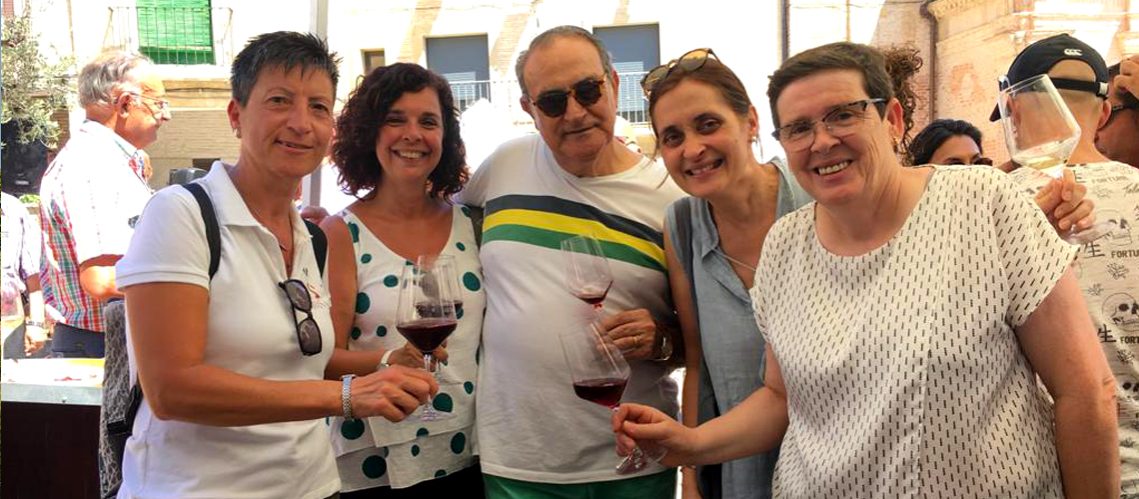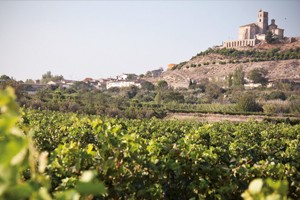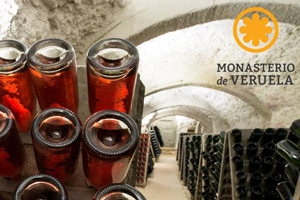Susana Ruberte, Aragon’s first female oenologist
- 27/01/2021
- Publicado por: Susana Escobar Luqui
- Categoría: Internacional

Susana Ruberte, Aragon’s first female oenologist: “In the winery we always have to be testing, innovating and improving every day”.
Susana Ruberte is the first female winemaker in Aragon and is the head of Bodegas Ruberte, belonging to the Campo de Borja Protected Designation of Origin. Since 2016, she also runs Bodegas Monasterio de Veruela, dedicated to the production of cava and also located in the town of Ainzón in the Zaragoza region. Veruela Monastery belongs to the Cava Designation of Origin and part of its space is underground caves covering some 600 square meters. With this project, in which Ana, one of her daughters is directly involved, Susana fulfilled one of her dreams: to be able to make cava in her own winery.
Ruberte, a great passionate about viticulture and everything that surrounds it, is also closely linked and committed to the solidarity actions carried out by the community around wine, such as the annual challenge of Diviñas Women, which she always attends or participates in.
- When and where did you study?
I started studying oenology in 1979. I spent three years in Madrid at the Escuela del Vino where I trained as a winemaker. I had previously completed a professional chemistry training in Barcelona.
- Where does your passion for wine come from?

My father is the “culprit” of my passion for wine. He was the one who instilled in me the love for this profession. As a child, I always saw him “on the job”: racking, blending wines and looking for a good wine that would please their customers. I loved being with him, I could spend hours watching what he was doing. We spent a lot of time together in the laboratory and he would leave me in charge of the analysis. They were insignificant tasks, but they made me feel very good, I felt that it was a great responsibility and I was always with all five senses attentive to everything that was “cooking” there.
At first, my parents sent me to study Administration in Zaragoza, but I have to admit that being surrounded by papers has never been my thing. So one day I told them what my true passion was: to study oenology and follow in my father’s footsteps. They always supported me in my decision, despite the doubts they had at first. You have to bear in mind that the world of wine has always been mainly masculine and even more so in those years. Oenology was not considered a profession for women.
- Your daughters, Alicia y Ana are now helping you in the winery, what is the best advice you have given them?
At the moment, my youngest daughter, Ana, who has also studied a degree in oenology, is with me. In her case, she studied in Cariñena.
I have always tried to convey that the most important thing is to do what you are passionate about. If you work in something that you like and you enjoy what you do, it is not a job, but a pleasure. For this reason, I always try to instil in them the passion that I have, although there are times when it is very hard.
- What is your main job in the winery?
At the moment, I do more management work than oenology, although I am always looking after the winemaking process and the vineyards. I love the harvest season, which for us is the most important time of the year. Each season, the grapes arrive in different conditions and you have to give your best to get the best wines. In the winery, 2+2 are never four and that is one of the things I like the most. You always have to be testing, innovating and improving day by day.
- If you had not dedicated yourself to the world of wine, what would you have done?
Right now, I would love to have a business related to rural tourism, a house, a small charming hotel… In short, to be able to show the wonders of our land.
- What characteristics does Aragonese wine have, regardless of the Designatio of Origin that no other wine in Spain has?
The low temperatures of winter make the wines have a good acidity, which helps to maintain the aromas for longer. In summer, the vineyards suffer from high temperatures and the lack of rain that, on some occasions, causes water stress. The latter translates into wines with more character, with more body, good structure and graduations between 14 and 15.
 La experiencia está siendo muy buena y estoy especialmente contenta por la implicación de mi hija. De hecho, es su proyecto. Yo estoy a su lado para aconsejarle y ayudarle en todo lo que necesite y, como madre, eso es una gran satisfacción.
La experiencia está siendo muy buena y estoy especialmente contenta por la implicación de mi hija. De hecho, es su proyecto. Yo estoy a su lado para aconsejarle y ayudarle en todo lo que necesite y, como madre, eso es una gran satisfacción.
El proyecto se basa en la elaboración de cava BrutNature con una buena crianza en botella. Las características de la bodega, principalmente sus bajas temperaturas, hacen que sea el marco ideal para ello.
La verdad es que el resultado está gustando mucho y el cava está siendo todo un éxito. La gente que no está acostumbrada a tomar cava, lo prueba y te dice: «este sí que me gusta». Y esto es, precisamente, lo que nos anima a seguir trabajando día a día en esta línea.
